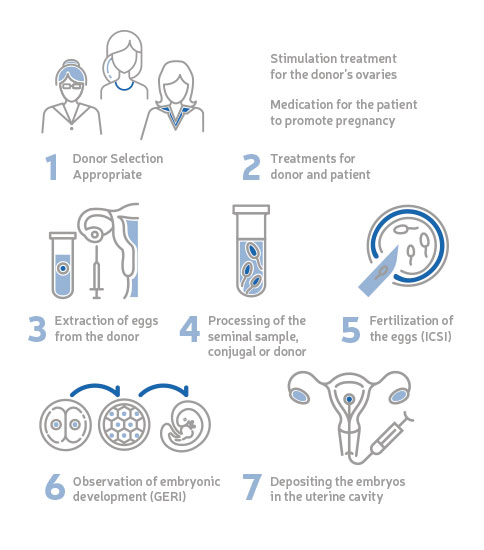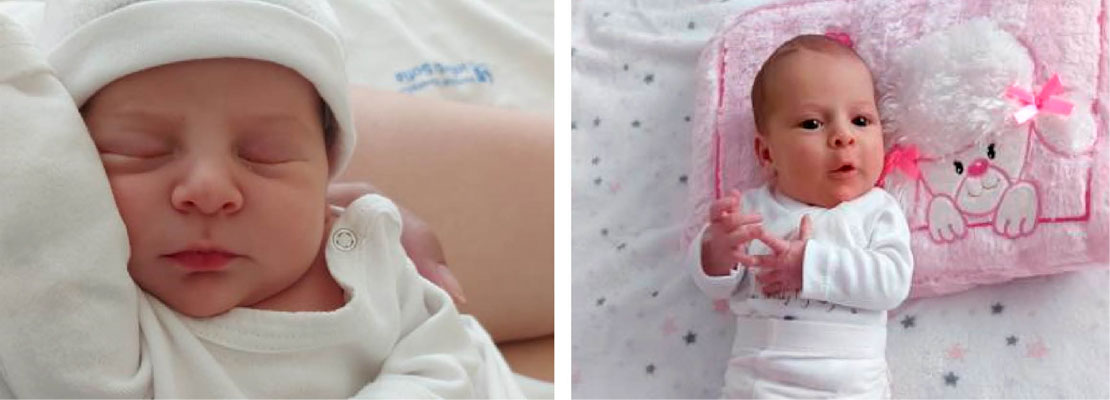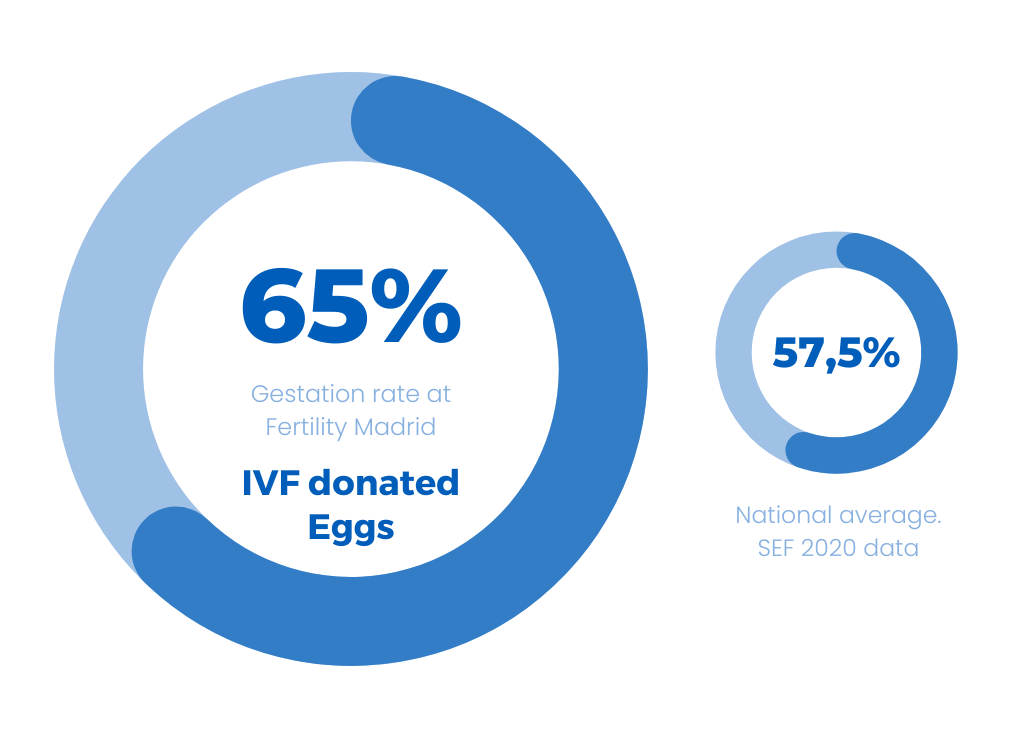On this page, you will find everything you need to know about IVF with donated eggs, an assisted reproduction treatment that can open the doors to motherhood for those couples struggling to conceive. We will delve into what egg donation is, who are the ideal candidates for this treatment, how the process works step by step, success rates, and what you can expect on your journey to motherhood through egg donation.
Our goal is to provide you with clear and understandable information so that you can make informed decisions about your fertility treatment. We are here to accompany you every step of the way, offering support and guidance. Let’s start this journey together! With you, we create life.
- What is IVF with donated eggs?
- When is IVF with Donated Eggs Indicated?
- IVF with Donated Eggs Process
- How are our egg donors selected?
- What Happens Before Starting IVF with Donated Eggs?
- Get to know the testimonials of our patients
- Success Rates of IVF with Donated Eggs and What Makes Us Unique
- Frequently Asked Questions (FAQ)
What is IVF with donated Eggs?
IVF with donated eggs involves performing in vitro fertilization using eggs donated by a healthy woman. This type of assisted reproduction treatment is one of the most effective, boasting a very high success rate in terms of pregnancy rates.
The IVF with donated eggs process involves stimulating the ovaries of the donor with specific medications for IVF, while simultaneously preparing your uterine lining for embryo transfer.
At Fertility Madrid, we provide you with the utmost peace of mind, which is why we offer a guarantee of 2 good-quality embryos in the IVF with Donated Eggs treatment.
In our clinic, you will find the best professionals to accompany you in your IVF with Donated Eggs treatment. Interested in knowing how the egg donation process works at Fertility Madrid?
Schedule your appointment, and we will inform you about all the details of the IVF with Donated Eggs treatment. Additionally, you can decide when to start the treatment as there are no waiting lists.
When is IVF with Donated Eggs Indicated?
Receiving donated eggs through IVF is primarily indicated for women who have lost their reproductive capacity or have genetic abnormalities. Particularly, for the following cases:
- Women with absent ovaries
- Women of advanced reproductive age (typically approaching their 40s)
- Women with premature ovarian insufficiency or premature ovarian failure, a disorder that directly affects ovarian functionality at an early age (before 40 years)
- Women with failed attempts to conceive through other assisted reproduction techniques
- Women with a history of miscarriages.
- Women with genetic anomalies; donated eggs mitigate hereditary risks and increase the chances of conception.
IVF with Donated Eggs Process
The IVF with Donated Eggs treatment for the donor involves ovarian stimulation using specific drugs to produce eggs. Subsequently, mature eggs are retrieved through a minimally invasive procedure called follicular aspiration, performed in the operating room under sedation.
The medical treatment for the patient involves properly preparing her endometrium to subsequently receive the embryos. This treatment will vary depending on whether the patient menstruates or not.
IVF with donated Eggs step by step
This initial stage includes explaining the process, counseling, and medical evaluations. Routine gynecological tests, blood, and urine analyses are required for both biological parents and the donor to ensure the safety of the patient and the future child. After reviewing the results, a personalized treatment plan will be established.
The selection is made completely personalized, taking into account each case.
In the first case, if the patient does not menstruate, GnRH agonists are used to avoid interference with other hormones, followed by controlled doses of estrogen and progesterone to prepare the endometrium. If menstruation does not occur, therapy is carried out solely with estrogen and progesterone. To determine when the endometrium is ready, several ultrasound checks are performed to measure its thickness. When the patient is prepared, we only need to wait for the donor to undergo ovarian puncture. The endometrium can be prepared in about 6 days, but a minimum of two weeks is recommended. Estrogen replacement therapy can last for more than 60 days without adverse effects to synchronize with a donor.
To determine when the endometrium is ready, several ultrasound checks are performed to measure its thickness. When the patient is prepared, we only need to wait for the donor to undergo ovarian puncture. On the day of the donor’s puncture, the patient is called to confirm the number of mature eggs assigned to her and to start treatment with progesterone.
The male partner needs to provide a semen sample to fertilize the eggs.
The fertilization process of the eggs using the seminal sample is carried out in Fertility Madrid’s laboratories. The ICSI technique is used to facilitate fertilization by directly injecting a sperm into each egg.
The progress and development of each embryo are studied. At Fertility Madrid, we use GERI Time-Lapse incubators that optimize the embryo culture conditions for each patient. This allows embryologists to select the best embryos for implantation with greater safety and accuracy, thereby increasing the chances of successfully achieving pregnancy.
The final step involves placing the previously developed embryos in the patient’s uterine cavity to continue the baby’s development in her own body. This intervention is performed in the operating room under sedation, so the patient experiences no pain.

How are our egg donors selected?
At Fertility Madrid, we apply rigorous selection criteria to ensure the quality and safety of our egg donation treatments. Each donor undergoes a thorough evaluation process before being selected.
- Medical Evaluation: Comprehensive tests are conducted, including blood analysis to determine blood type and Rh compatibility, as well as to detect infectious diseases such as HIV, hepatitis, and syphilis. Additionally, genetic tests are performed to identify possible hereditary diseases.
- Genetic Counseling and Evaluation: The donor’s family history is analyzed, assessing any significant hereditary factors. This evaluation provides a deeper understanding of the donor’s genetic health and helps identify potential genetic risks for offspring.
- Genetic Carrier Screening: A comprehensive assessment is conducted to identify the risk of severe autosomal recessive genetic disorders and X-linked disorders.
- Psychological Evaluation: Each donor undergoes a psychological evaluation to ensure they are emotionally prepared for the donation process and do not suffer from any type of mental disorder.
What Happens Before Starting IVF with Donated Eggs?
Before initiating the egg donation treatment, it is essential to conduct a comprehensive personalized assessment to confirm that this treatment is suitable for the patient.
At Fertility Madrid, we perform a complete gynecological assessment and conduct screening tests and checks for both egg donors and recipients, as well as for men.
These tests are conducted with the aim of ensuring the safety and efficacy of the egg donation process. Below, we outline some of the tests and checks we perform:
For Egg Donors:
- Medical History: Collection of medical, psychological, and reproductive information of the donor, as well as relevant family information.
- Gynecological Examination: Includes ultrasound, cytology, and swab.
- Blood Tests: Anti-Müllerian hormone, RH factor, detection of infectious diseases, and toxic substances.
- Genetic Carrier Testing: Analyzes chromosomal abnormalities and hereditary factors.
- Psychological Consultation: Mental health assessment of the donor.
For Woman Patient:
- Medical History: Detailed medical and reproductive history of the recipient.
- Evaluation of Uterine Condition: To verify the health of the uterus and its ability to carry out gestation.
- Hormonal Analysis: To assess hormonal levels and ensure an appropriate response to treatment.
- Genetic Compatibility Testing: To identify potential genetic risks that could affect the embryo’s health.
For Men:
- Semen Analysis: To evaluate the quality and quantity of sperm, as they will be used in fertilizing the donated eggs.
- Genetic Compatibility Testing: To detect potential genetic issues that could affect the embryo’s health.
These pre-IVF with Donated Eggs assessments are crucial for personalizing your treatment and ensuring optimal results. Our professional team is available to provide guidance and address any questions you may have during this process.
Get to know the testimonials of our patients

We would like to greet Dr. Óscar Oviedo and all the team at Fertility Madrid and thank them for the treatment we have received at the clinic from the first moment we arrived there.
From the very first moment Dr. Óscar explained to us in detail the treatment we had to undergo, he treated us with great professionalism and seriousness.
From the reception girls, nurses, embryologists, Dr. Óscar Oviedo, we were treated with great affection and professionalism at all times.
It has been a very very complex treatment, not at all easy but with 100% success. The treatment has been a success for us, since the first transfer we got it.
It has been 9 long months, very very controlled and on the 15th of November our precious baby was born, a beautiful girl, so desired.
Thank you very much.
Success Rates of IVF with Donated Eggs and What Makes Us Unique
At Fertility Madrid, we have a success rate in Egg Donation treatment that is over 12% higher than the Spanish average (SEF 2020 data).
Our success rate in Egg Donation treatments stands at 65% with conjugal semen by transfer.
We strive to offer the utmost peace of mind to our patients; therefore, we provide treatments at a fixed price and include a guarantee of 2 good-quality blastocysts.
*Guarantee of 2 good-quality blastocysts with FISH and Seminal Fragmentation within normal parameters.

Frequently Asked Questions (FAQ)
The IVF with Donated Eggs treatment duration can vary depending on several factors, such as specific medical protocols and donor availability. However, generally speaking, the entire process can take approximately 8 to 10 weeks from the start of hormonal treatment to embryo transfer. This includes donor selection and synchronization, recipient uterus preparation, egg fertilization, and necessary medical monitoring. It’s important to remember that each case may be unique and require a personalized timeline based on individual needs or genetic testing.
The age limit for undergoing Assisted Reproduction Treatment in Spain is 50 years.
IVF with donated eggs is indicated for all women who, while retaining their uterus, have lost their reproductive capacity or may transmit chromosomal anomalies or diseases to their children. The most common cases include:
- Early menopause or premature ovarian failure.
- Absence of ovaries (congenital or previous surgery).
- Having healthy ovaries but not enough eggs (due to age or genetic factor).
- Previous failure of assisted reproduction techniques.
- Having poor-quality eggs or embryos.
- Suffering from or being a carrier of genetic diseases that may be transmitted to offspring and cannot be diagnosed through PGD.
- High success rate: Higher-quality eggs leading to higher pregnancy rates.
- Solution for fertility problems: Option for women with ovarian problems.
- Personalized donor selection: According to your phenotype (skin color, eyes, RH).
- Reduction of the risk of genetic problems: The likelihood of transmitting genetic anomalies is reduced.
The IVF with Donated Eggs treatment includes several processes that could cause some discomfort, although the experience may vary from person to person. Here’s a summary of the stages that could cause some discomfort during the procedure:
- Ovarian stimulation: Hormonal medications used to stimulate egg production may occasionally cause mild side effects such as bloating, mood swings, and breast tenderness.
- Follicular puncture: It is performed under sedation, so the patient does not feel pain during the procedure itself. Afterwards, some women may experience mild cramps, swelling, or discomfort, which tend to disappear within a few hours.
- Embryo transfer: This procedure is quick and relatively simple, and usually not associated with significant discomfort. Some women may experience slight discomfort or cramping during or after the transfer.
- Luteal phase support: Hormonal medications such as progesterone are commonly used to support the uterine lining during this phase. While some women may find the injections slightly uncomfortable, others may not experience significant discomfort.
IVF with Donated Eggs is a relatively safe procedure, but like any medical intervention, there are potential risks. Some mild side effects may include:
- Abdominal discomfort, bloating, cramps
- Temporary hormonal changes due to ovarian stimulation.
Rarely, the following side effects may occur:
- Ovarian hyperstimulation syndrome
- Infections or adverse reactions to anesthesia during egg retrieval.
However, at Fertility Madrid, we provide careful medical evaluation and professional attention, significantly minimizing these risks, allowing most women to have a safe and successful experience with IVF with Donated Eggs.
It’s important for patients to be fully informed about these potential side effects and risks before deciding to undergo IVF with Donated Eggs.
The assignment of an egg donor to a recipient is based on the characteristics of the recipient. Firstly, according to blood type and Rh factor, ensuring compatibility between both. We also aim to match race, skin color, hair, and eye color.
Currently, in Spain, egg donation is completely anonymous, meaning there can be no connection between the donor and the recipient: neither donors can know the future recipients of the eggs, nor recipients can know who has donated their gametes to help them have children.
Egg donation is an anonymous and altruistic act. Egg donors receive financial compensation for any inconvenience caused, travel expenses, and the treatment they undergo. This financial compensation is regulated by the Royal Decree-Law 9/2014, of July 4, on quality and safety standards for donation.
Yes, IVF with Donated Eggs treatment is offered to single women who wish to become mothers and to same-sex female couples who need to resort to egg donation.
It is essential to follow all the indications of the professionals at Fertility Madrid, especially regarding the hormonal medication necessary to prepare your uterus for embryo implantation. We will be by your side to advise you on the steps to follow, ensuring that the treatment has the best chances of success.
Additionally, you can follow healthy habits such as:
- Balanced and healthy diet, rich in fruits, vegetables, lean proteins, and healthy fats.
- Avoiding alcohol, tobacco, and drugs as they can affect your health.
- Regular physical activity to maintain a healthy weight and reduce stress.
- Taking vitamin supplements, especially folic acid, to ensure adequate reproductive health.




 C/ General Oráa 47, 28006, Madrid
C/ General Oráa 47, 28006, Madrid (+34) 910 052 808
(+34) 910 052 808

 Appointment
Appointment 


